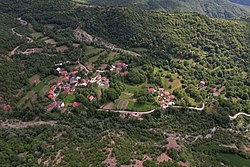Breštani
Appearance
Breštani
Брештани Breştanik | |
|---|---|
Village | |
 Airview of the village | |
| Coordinates: 41°27′15″N 20°35′09″E / 41.45417°N 20.58583°E | |
| Country | |
| Region | |
| Municipality | |
| Population (2021) | |
• Total | 104 |
| Time zone | UTC+1 (CET) |
| • Summer (DST) | UTC+2 (CEST) |
| Car plates | DB |
| Website | . |
Breštani (Macedonian: Брештани, Turkish: Breştanik) is a village in the municipality of Centar Župa, North Macedonia.
Demographics
[edit]The village is inhabited by a Turkish speaking population consisting of Turks.[1][2]
According to the 1942 Albanian census, Breštani was inhabited by 258 Muslim Albanians.[3]
As of the 2021 census, Breštani had 104 residents with the following ethnic composition:[4]
- Turks 101
- Persons for whom data are taken from administrative sources 3
According to the 2002 census, the village had a total of 120 inhabitants.[5] Ethnic groups in the village include:[5]
- Turks 120
References
[edit]- ^ Vidoeski, Božidar (1998). Dijalektite na makedonskiot jazik. Vol. 1. Makedonska akademija na naukite i umetnostite. ISBN 9789989649509. p.214. "Турски етнички елемент живее во Жупа - во селата: Коџаџик, Новаци, Брештани, Елевци, Евла, Долгаш, Ослоница и Праленик, и нешто во градот Дебар." p. 326.
- ^ Bunguri, Adem (2009). "Kalaja e Koxhaxhikut (Dibër) [Koxhaxhik's Castle (Dibër)]". Studime Historike (1–02): 44. "Është kjo arsyeja që pranë kalasë së Koxhaxhikut sot gjenden 6 fshatra turqishtfolës, që janë: Pralanik, Breshtan, Novak, Elefc, Koxhaxhik dhe Dollgash."
- ^ "Ethnic/Religious composition of Dibër and Tetovë prefectures".
- ^ Total resident population of the Republic of North Macedonia by ethnic affiliation, by settlement, Census 2021
- ^ a b Macedonian Census (2002), Book 5 - Total population according to the Ethnic Affiliation, Mother Tongue and Religion, The State Statistical Office, Skopje, 2002, p. 188.
Wikimedia Commons has media related to Breštani.

